Pakistan seeks changes in free trade agreement with China
ISLAMABAD: Pakistan will try to convince Chinese authorities to revise the existing free trade agreement (FTA) on the less-than-equal reciprocity principle, Commerce Minister Pervaiz Malik told Dawn on Friday.
The move is aimed at overcoming the trade imbalance that exists between the two countries.
“We will demand an early-harvest programme in the existing FTA that will cover 100 items of Pakistan’s export interest,” Mr Malik said.
Negotiation teams briefed the minister about the trade agreements with China and Thailand. The briefing was part of the preparation ahead of the eighth round of negotiation on the second phase of the FTA to be held in Beijing on Sept 14-15.
Commerce Secretary Younus Dagha will lead a technical team to represent Pakistan in the secretary-level talks.
Eighth round of negotiation on the 2nd phase of trade pact to begin next week
Mr Malik said China signed several bilateral and regional FTAs, which limited the benefit of preferences to Pakistan. China’s FTA with the Association of Southeast Asian Nations countries has also made the preferential treaty for Pakistan mostly irrelevant. For example, China charges 3.5 per cent duty on the import of yarn from Pakistan under the FTA while it also charges the same duty on imports from India without any treaty.
This shows the FTA has become mostly irrelevant for Pakistan. The minister said his ministry has worked out various proposals that will be presented during the upcoming round of negotiations.
The minister said Pakistan will urge China to enter into the early-harvest programme. “We also raised this issue with Pakistan’s foreign minister before his visit to China,” he said, adding that the ministry also sought help from the Foreign Office to make the treaty beneficial.
But another official told Dawn that Pakistan may not sign the second phase of the FTA as it fears that the move will further increase imports from China. Authorities in Beijing are unwilling to accept Islamabad’s demand for the revival of the preferential treatment for exportable products under the FTA, the official added.
As per the original plan, the second phase was supposed to be implemented from Jan 1, 2014. Both countries started negotiations for the second phase in 2011. The FTA covers more than 7,000 tariff lines at eight-digit tariff code under the Harmonised System (HS). Both sides have held seven rounds of negotiation on the second phase to break the deadlock.
An official statement issued after the meeting said the commerce minister showed satisfaction over the progress of the FTA negotiations. He directed the negotiating team to work vigorously to conclude the agreement in the best interest of Pakistan.
Currently, Pakistan has reduced the duty on 35pc products to zero per cent while China has reciprocated by reducing the duty on 40pc products of Pakistan’s exports to zero per cent. The official said Islamabad was also reviewing the services agreement with the Chinese authorities.
A commerce ministry report revealed that Pakistan could not utilise the concessions granted by China under the first phase. It only exported in 253 tariff lines, where the average export value was $500 or more, which was around 3.3pc of the total tariff lines (7,550) on which China granted concessions to Pakistan.
Pakistan’s key exports to China were raw material and intermediate products, such as cotton yarn, woven fabric, grey fabric etc. Value-added products were missing despite the fact that some of these products, like garments, were included in the concessionary regime.
On the FTA with Thailand, the minister said it was still in the early stage. However, he said interests of local industries will be protected under the proposed FTA. Thailand demands market access for the auto sector and rice.
Published in Dawn, September 9th, 2017















































